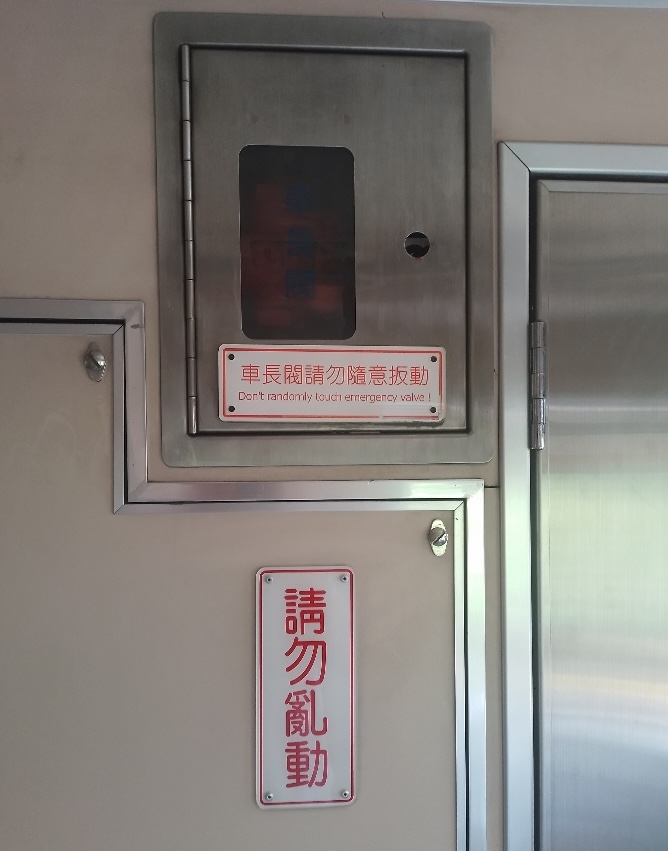Don't randomly touch emergency valve!
« previous post | next post »
A sign just outside the driver's cab of a TRA (Taiwan Rail) aging diesel on the Pingxi Line that climbs along the edge of the Keelung River ravine, just outside Taipei.
The horizontal sign on the small metal panel door above reads:
chēzhǎng fá qǐng wù suíyì bāndòng
車長閥請勿隨意扳動
"conductor's valve: please do not carelessly / casually turn / pull"
The vertical sign beneath it:
qǐng wù luàn dòng
請勿亂動
"please do not tamper / meddle"
Selected readings
- "Taiwan Railways Administration logo" (12/30/18)
- "Taiwan cares about its indigenous languages" (2/24/25) — train station signage; I think I have another post where I mention train station announcements, but can't find it now
[Thanks to AntC]

Jonathan Smith said,
July 31, 2025 @ 11:40 pm
This and the endless similar examples are because Chinese languages love adverbs in places where English and others prefer V[O]. Mand. 那樣做 vs. Eng. 'do that' is kind of a template. Hsieh Hsin-I when at UHM was fond of making this observation wrt e.g. Mand. 走錯房間 etc. vs. Eng. 'go to the wrong room' etc. Sapir–Whorf vibes… Above it is Mand. 亂 and 隨意 being the most natural of adverbs where Eng. would prefer just 'mess with' or 'tamper'… not 'randomly/carelessly verb' etc. in any idiomatic version. Stuff like 亂吃藥, introductory-textbook-type language, is somehow hard to translate on the fly into idiomatic English… again I guess VO: 'take random medicine(s)' or something.
AntC said,
July 31, 2025 @ 11:43 pm
Thank you Prof Mair.
There was only a flimsy door/glass panel keeping passengers out of the driver's cab. That was plastered with obvious-enough 請勿's to not talk to/distract the driver nor crush against the door. When the train reverses, the driver swops to the cab at the opposite end, so presumably the conductor lurks thereabouts.
That 請 looks the very devil to write in a small space, especially considering how many public signs include it. I see Simplified script ruthlessly slims down its left half.
AntC said,
July 31, 2025 @ 11:56 pm
Yes @Jonathan, my immediate reaction was how hazardous it is to mix negation and adverbs in English. (Is it ok to manipulate the valve with deliberate intent? That is, does the "don't" apply to the "randomly" only or to touching tout court?)
VVOV said,
August 1, 2025 @ 8:15 am
As an American in his mid 30s, the rendering of something meaning "carelessly / casually" as "randomly" reminds me strongly of mid 2000s millennial teenager speak, like "I randomly decided to wear all green today!" (i.e. impulsively, unpredictably, strangely, nonsensically, surprisingly – but not literally at random).
Some similar examples adapted from results of a quick google search.
"Stop randomly using racist and biased phrases."
"My teacher was explaining slang to us today and randomly just dropped 'slay', LMFAO."
"I randomly received this weird letter in the mail today."
Yves Rehbein said,
August 1, 2025 @ 9:01 pm
@ VVOV, this reminds me I wanted to look up randy: "(chiefly Scotland) Rude or coarse in manner." Apparently of uncertain origin, more at randan, "(Scotland) Riotous or disorderly behaviour." Which is surprisingly random. https://en.wiktionary.org/wiki/randy
AntC said,
August 2, 2025 @ 8:06 am
Chinese languages love adverbs
In the same vein, on a steep staircase climbing to a (very busy) Dim Sum restaurant in Central Taipei:
means presumably: be careful _not_ to slide/slip.
Victor Mair said,
August 3, 2025 @ 9:40 am
Yes, indeed, AntC.
"'Carefully Fall Into The Cliff'" (12/11/21) — classic
https://languagelog.ldc.upenn.edu/nll/?p=52983
"Slip carefully" (5/6/14) — with plentiful example texts and images
https://languagelog.ldc.upenn.edu/nll/?p=12154
Jonathan Smith said,
August 3, 2025 @ 4:40 pm
VVOV's examples with Eng. "randomly" definitely check out — and anyway the notion of "preference for adverbs in Sinitic vis-a-vis say English" remains most inchoate… and may indeed have some connection to negation as suggested by AntC.
Re "xiaoxin", these examples are of course *not* adverbial in Chinese but end up wrongly translated as such. In regular language one says 小心別… "be careful not to…" but in certain semi-formal contexts this gets truncated to 小心… lit. "be careful to…"